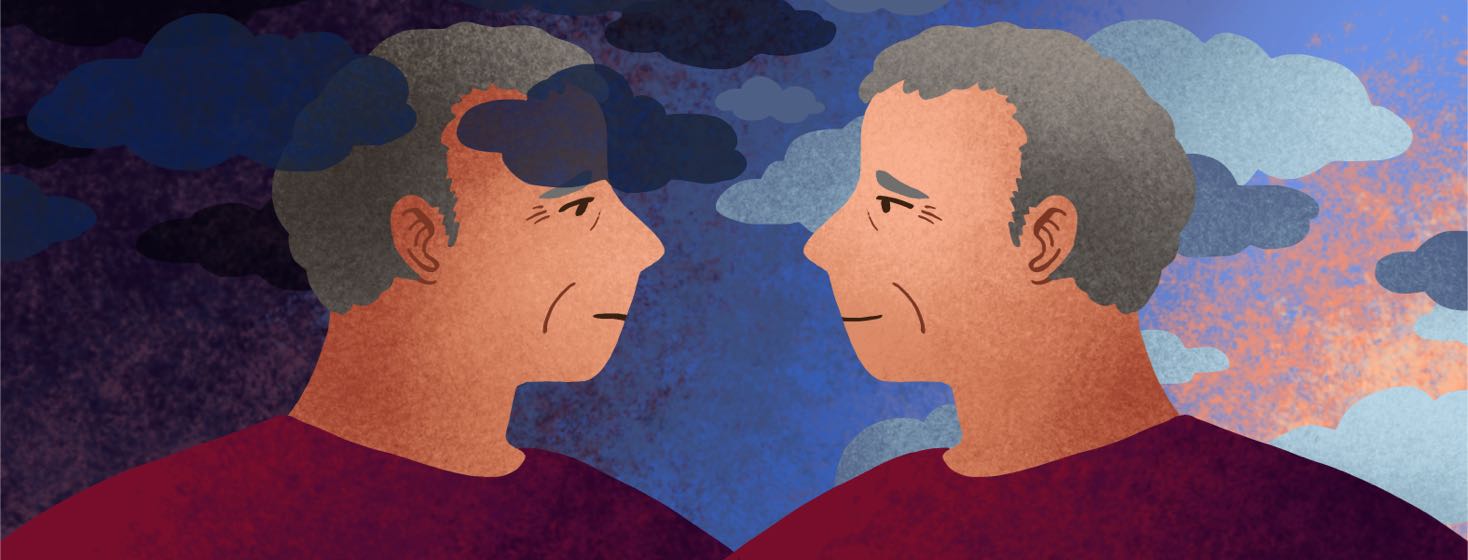Do I Know You? Getting Mental Health Support
“I didn't feel I could ask Julie to be involved... I felt lonely, then I became scared, and then angry...”
It's hard to say whether medical treatment or emotional and mental health trauma is the more difficult part of living with prostate cancer. Our doctors treat the cancer, but then we are most often shuffled out the door to deal with the mental and emotional trauma on our own. We are left to flail about and find our own direction.
Needing emotional support
It's no secret to those of us with prostate cancer and our loved ones that we need mental health support as part of patient-oriented treatment. Sadly that is not there for most of us. Instead, a loving partner, friends and faith provide support as we deal with the mental and emotional turmoil.
For some of us, that loving circle is difficult to maintain.
Prostate cancer hits us where we are most vulnerable: our self image and our confidence in our fulfilling the role of stoic, in control, self-sufficient protector and provider. Change in sexual function and incontinence can make us feel we have lost our masculinity.
Feeling fearful and angry
Then hormone treatment can take it all to a new level. We may feel we are no longer attractive to our loved ones. Relationships can suffer as we pull away or fail to let loved ones know we still care.
No one ever accused me of being macho, and I thought I'd avoid going down that rabbit hole, but there I went:
“I didn't feel I could ask Julie to be involved...” I was excluding Julie, pushing her away.
“I felt lonely, then I became scared, and then angry...”
I feared dealing with the unknown. I was angry with not being able to be Julie's protector and provider as she battled the effects of a stroke. I became angry that this would happen to us, and I became angry that I would no longer be able to make choices in my life.
A wake-up call
A suggestion by the Salem Health Cancer Institute's (SHCI) social worker that I ask Julie what she thought of dealing with cancer, rather than excluding her, was a wake-up.
We look in the mirror and think, “Do I know you?”
Team members here have told us how they have found relief from the mental and emotional stress by following their passions; running marathons, jogging, hiking and bicycling. Some of us write to share our experiences to try to pay it forward. And, as have other men, I found the need to work with a mental health professional to sort out my feelings, fears and the hormone therapy driven emotions.
People trying to make change
But these are all bits and pieces of the answer. Change in the medical practice goes at the rate of a glacier, but there are people trying to make changes and create support plans that will be part of the overall treatment.
One group is the Oregon Health and Science University (OHSU), which is running a study of exercise in dealing with after-effects of hormone treatment. I am excited to be part of one of their studies, but even more excited that the OHSU group is pushing to make exercise an integrated part of treatment.
Expanding support
Another is Dr. Richard Wassersug, a cancer patient who has undergone longterm hormone treatment and has studied and written extensively on both gay and straight relationships during hormone treatment. Dr. Wassersug has been heavily involved in patient support for years. Now he is involved in rolling out integrated support in Canada.
Dr. Wassersug co-authored the book “Androgen Deprivation Therapy: An Essential Guide for Prostate Cancer Patients and Their Loved Ones”, which is the basis for the Canadian support plan. It is a workbook for couples living with prostate cancer and hormone therapy, a sort of “Do It Yourself” life and relationship support plan.
Our own best advocates
In the end, we are our own best advocates. We need to make other men and their loved ones aware of the need to push for mental health and emotional support. We need to make sure our medical providers are aware of the need to expand their treatment to include this support.

Join the conversation